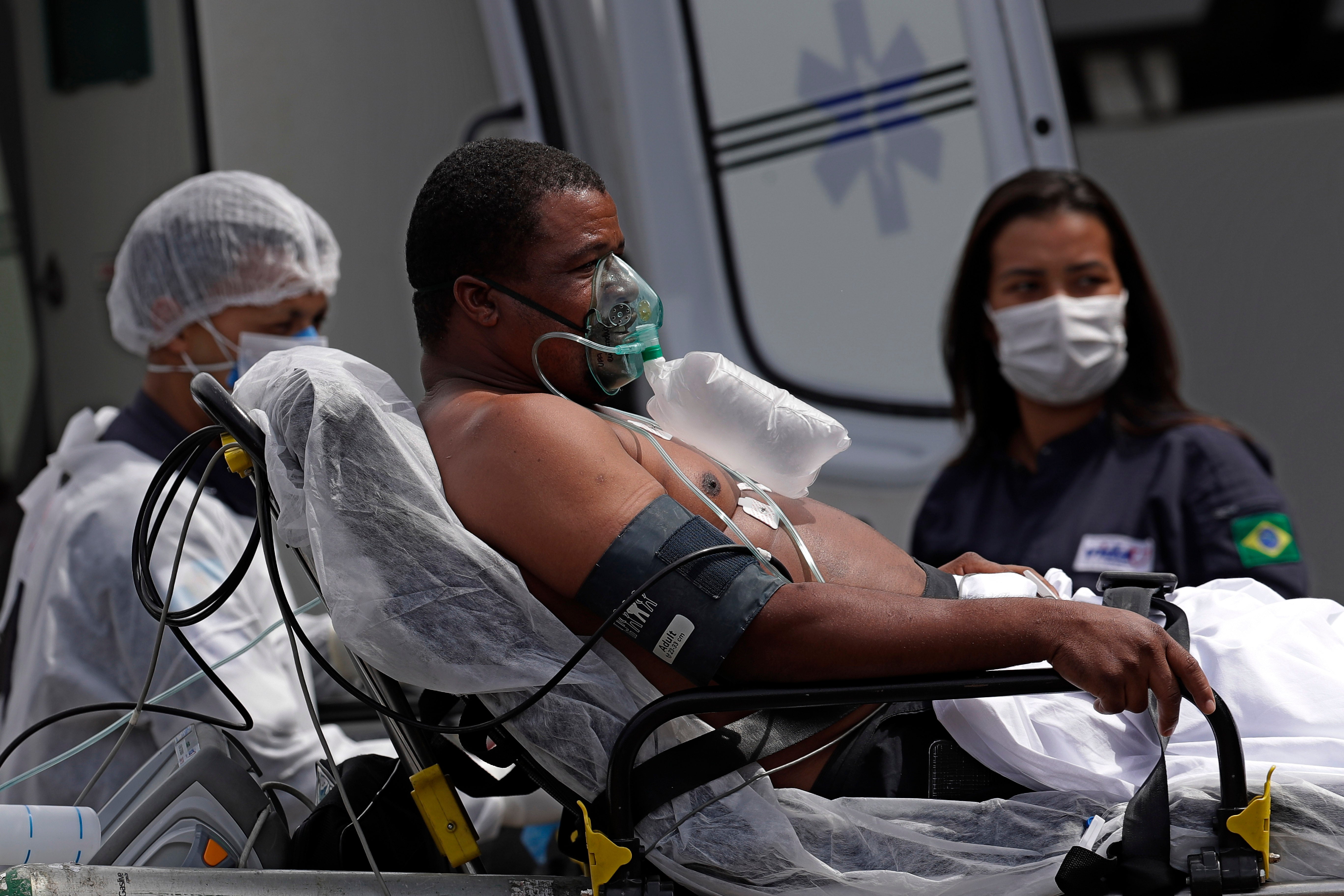Shortage of intubation drugs threatens Brazil health sector
Reports are emerging of Brazilian health workers forced to intubate patients without the aid of sedatives, after weeks of warnings that hospitals and state governments are running out of critical medicines

Your support helps us to tell the story
From reproductive rights to climate change to Big Tech, The Independent is on the ground when the story is developing. Whether it's investigating the financials of Elon Musk's pro-Trump PAC or producing our latest documentary, 'The A Word', which shines a light on the American women fighting for reproductive rights, we know how important it is to parse out the facts from the messaging.
At such a critical moment in US history, we need reporters on the ground. Your donation allows us to keep sending journalists to speak to both sides of the story.
The Independent is trusted by Americans across the entire political spectrum. And unlike many other quality news outlets, we choose not to lock Americans out of our reporting and analysis with paywalls. We believe quality journalism should be available to everyone, paid for by those who can afford it.
Your support makes all the difference.Reports are emerging of Brazilian health workers forced to intubate patients without the aid of sedatives, after weeks of warnings that hospitals and state governments risked running out of critical medicines.
One doctor at the Albert Schweitzer municipal hospital in Rio de Janeiro told the Associated Press that for days health workers diluted sedatives to make their stock last longer. Once it ran out, nurses and doctors had to begin using neuromuscular blockers and tying patients to their beds, the doctor said.
“You relax the muscles and do the procedure easily, but we don’t have sedation,” said the doctor, who agreed to discuss the sensitive situation only if not quoted by name. “Some try to talk, resist. They’re conscious.”
Lack of required medicines is the latest pandemic problem to befall Brazil, which is experiencing a brutal COVID-19 outbreak that has flooded the nation’s intensive care units. The daily death count is averaging about 3,000, accounting for a quarter of deaths globally and making Brazil the epicenter of the pandemic.
“Intubation kits” include anesthetics, sedatives and other medications used to put severely ill patients on ventilators. The press office of Rio city's health secretariat said in an email that occasional shortages at the Albert Schweitzer facility are due to difficulties obtaining supplies on the global market and that “substitutions are made so that there is no damage to the assistance provided.” It didn't comment on the need to tie patients to beds.
The newspaper O Globo on Thursday reported similar ordeals in several other hospitals in the Rio metropolitan region, with people desperately calling other facilities seeking sedatives for their loved ones.
It’s unclear whether the problem seen in Rio remains an isolated case, but others are sounding the alarm about impending shortages.
Sao Paulo state's health secretary, Jean Carlo Gorinchteyn, said at a news conference Wednesday that the situation was dire in the hospitals of Brazil's most-populous state. On Thursday, more than 640 hospitals were on the verge of collapse, with shortages possible within days, officials said.
“We need the federal government's support,” Gorinchteyn said. “This is not a necessity for Sao Paulo; it is a necessity for the whole country.”
His state's health officials sent nine requests for intubation medication to the Health Ministry over the past 40 days, according to a statement Wednesday. Its last delivery was enough to cover just 6% of monthly needs in the state’s public health network, officials told AP.
Federal Health Minister Marcelo Queiroga, who took over the post last month, said Wednesday that a shipment of sedatives was expected to arrive in Brazil “in the next ten days.” It is the result of a contract signed with the Pan American Health Organization.
He said two separate efforts to acquire medications on the international market are underway “to end this day-to-day struggle.”
For many weeks, the ministry has also been facing logistical constraints on getting oxygen delivered to hospitals across the country. Queiroga said it remains "a daily concern.″
A more contagious coronavirus variant, known as P.1, has been spreading across Brazil this year. It may also be more aggressive than the original strain, and health workers have reported patients requiring far more oxygen than last year.
The private sector has stepped up to help address some of the supply shortfall. A group of seven large companies donated 3.4 million doses of intubation drugs — enough for the management of 500 beds for six weeks — to the Health Ministry.
A first batch of 2.3 million was scheduled to arrive from China late Thursday at Sao Paulo's international airport and would be distributed to states with critical shortages, the ministry said in an emailed response to AP questions about supply bottlenecks.
Last month, the Health Ministry requisitioned intubation medications from laboratories, reportedly as a means to distribute to the neediest hospitals. That has caused others facilities’ stocks to dwindle, said Edson Rogatti, director of an association of more than 2,000 hospitals nationwide.
“If we run out, the health sector will be in chaos,” Rogatti said on Globo News TV.
Shortages aren’t limited to the public sector. Brazil’s private hospital association published a survey Thursday in which nine of 71 institutions reported having supplies for five days or less. About half said they had enough for a week.
Private facilities are looking to import medications from India but still need regulatory approval, the association told AP.
The city of Itaiopolis in southern Santa Catarina state this week reported shortages of both sedatives and oxygen. Neighboring Rio Grande do Sul state also reported supplies running out.
“The situation is desperate,” Rio Grande do Sul’s health secretary, Arita Bergmann, said in a statement Thursday. “We urgently need the Health Ministry to replenish hospitals’ stocks, or else intubated patients can wake up without medication, and that would be terrible.”